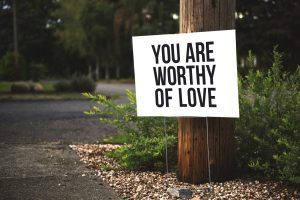By Kirsten Kenward
Self-Love has been a major buzz topic that has come up over the past few years. The fact that there is so much attention being paid to this term signals that people are very interested in, and intrigued by, the idea of loving… ourselves?
Sure, we know how to show love to others. We practice caring for those around us daily, whether through our work, at home, or by giving to charity. However, when it comes to self-love, we aren’t so free to give.
Struggling with an eating disorder adds an entire new layer to this dilemma.
There is a stigma in our society that putting ourselves first is associated with selfishness, greed, and disregard for the betterment of the world and those around us. Sadly, eating disorders are often thought of as narcissistic, selfish mental illnesses that affect only those in more affluent nations. However, this kind of stereotyping does no good. Eating disorders are a symptom of a sick, materialistic society, and so we must dig deeper if we want to begin to heal.
Ultimately, ideas about selfishness stem from a viewpoint of “lack.” A belief that there is not enough to go around, whether it be resources, intelligence, money, or, primarily, L O V E.

When an eating disorder sufferer uses food to repress or push aside feelings of unworthiness and shame, they are hurting themselves. These behaviours show a lack of self-love, self-regard, and self-compassion. They show a search for recognition of worth from outside of themselves, from a society that will never be able to provide them with what they are searching for: the ability to love themselves for no reason at all.
Because our society largely emphasizes what is wrong with the world (have you ever watched the news?!), we are conditioned to look for the same flaws in our own lives.
How can I lose 10 pounds?
How come that person has a nicer car than me?
When will I get a promotion?
It’s no wonder we can become obsessed with what we think we are missing. And also, no wonder that eating disorders are running rampant as a symptom of this problem.
So, what can we begin to do on an individual scale to incite some change? First, we can learn to give ourselves the benefit of the doubt.
“It’s okay, you are human and you are learning as you go.”
We can begin to show compassion in situations where we would normally beat ourselves to a pulp. We can change our inner dialogue from, “You’re so flawed,” to, “It’s okay, you are human and you are learning as you go.” You’ve probably been in a dark, self-blaming place before and you’ve made it out alive, right? You can do it again, and again, until it doesn’t seem like such a feat.
Second, we can learn to listen to our unique intuitions and connect to our ‘selves’.
Struggling with an eating disorder often means that someone is extremely disconnected to their own body, and soul. We who struggle put the desires of society before our own nourishment and wellbeing and often push our bodies near death while doing so. It is SO important in recovery to learn to connect back with the needs of our bodies and to learn to listen for our internal compass/intuition. Deep inside us, we know that denying our bodies proper nutrition and speaking to ourselves in a derogatory manner are so detrimental to our overall well-being. It takes a great amount of strength and resilience (and time) to begin to want to heal, since there is a ton of shame surrounding the disregard we have shown ourselves during our struggles. However, little by little, it is possible to reconnect. You can take a moment each day to listen in to your thought patterns, you can contact a therapist to work through some of your dysfunctional habits, or you can go for a mindful walk daily to clear your head. However you choose to connect back to learning about yourself will be so beneficial in your healing.
Third, we can talk it out.
Sharing our diverse struggles and experiences often helps not only ourselves, but those around us who may be working through similar things and are not yet ready to speak up.
Be a guiding light in a fearful society. In this way, you are fighting the lack, building a tribe of likeminded friends, and showing others love through respecting yourself.
Photo by Tim Mossholder on Unsplash
 Born and raised in North Vancouver, Kirsten is inspired by nature and the diversity of cultures around her to write about what she sees and experiences. She has a Bachelor's Degree in History and English which she completed at the University of Toronto in 2012, though during this time struggled with anorexia and body dysmorphia. She plans to dedicate her life to awareness of mental and physical health and has been a certified Personal Trainer for over 4 years. She finds freedom and joy through physical endeavours of all kinds, as well as sharing her experiences through writing and dialogue.
Born and raised in North Vancouver, Kirsten is inspired by nature and the diversity of cultures around her to write about what she sees and experiences. She has a Bachelor's Degree in History and English which she completed at the University of Toronto in 2012, though during this time struggled with anorexia and body dysmorphia. She plans to dedicate her life to awareness of mental and physical health and has been a certified Personal Trainer for over 4 years. She finds freedom and joy through physical endeavours of all kinds, as well as sharing her experiences through writing and dialogue.